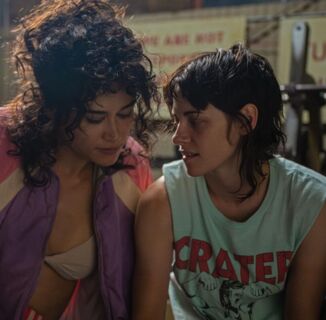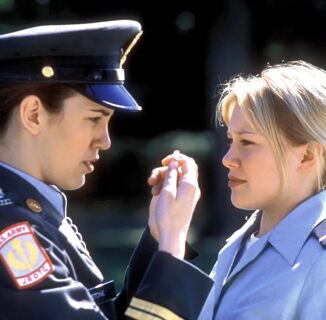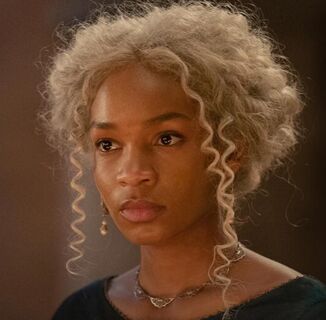I’ve never seen Psych. But there’s a scene from it that I’m familiar with; it’s one of the things that pops up on my Twitter feed every now and again. The two male leads are investigators who find themselves on the set of a TV show. When Gus says that the show “seems a little white,” he’s told that it’s because the show is set in London 1888. His response: “So what are you saying? Black people hadn’t been invented yet?”

While it seems like Psych is worlds away from Colette and The Favourite, two period films in theaters this fall, the comment about the “invention” of black people is an interesting way into considering these two films, and the ways in which they are quietly groundbreaking by being loudly queer. There’s a tendency in period films for queerness to be shoved into the closet; the queer identity of historical figures is ignored in films including Frida and Saving Mr. Banks. This erasure tends to put forward a certain view of history, and the homogenous image of the past presented has no room for the messiness and uncertainty of queer identities.
Even films from the more recent past, like Bohemian Rhapsody, are being taken to task for the ways in which they treat queerness. It seems that no matter how near or far from the present a historical film is, it still needs to present things as being a certain way; one that is homogenous, and accessible to the majority.
So when films like The Favourite and Colette come along, it feels less like a breath of fresh air and more like the hurricane that brought Dorothy to Oz. The former is a story of backstabbing, throwing shade, and clawing for power in the court of an ailing queen; the latter a biopic of the acclaimed French author. On paper, the story of The Favourite doesn’t lend itself to queer ideas and characters, and although Colette is about a real-life queer person, it is a rarity for her identity to be foregrounded so explicitly.
To be the “favourite” of Queen Anne (played by national treasure Olivia Colman) means more than just being her closest confidant and ruling by proxy. The Queen’s favourite is her lover, and although the romances that the Queen has with the women in her life are clandestine, they are never shown to be shameful. Instead, these relationships, rooted in reality, are a fascinating exploration of intimacy, power, and what happens when the two of them collide.
Queen Anne is unapologetic in the way that she describes her desires, even if it does have unfortunate political knock-on effects around the kingdom. She says of Abigail (Emma Stone), “I like it when her tongue’s inside me,” a line that was met with applause in the cinema.
So often, period films are rendered in a way that makes them dry and sexless, especially when it comes to queer characters. They are tragic, unable to live their “truth” based on the times they are born into. There’s some truth to this, as countless people have lived in hiding or fear based on their sexuality, but for cinema to seemingly ignore any queer people who were alive before Philadelphia sets a dangerous precedent. Through the eyes of period drama, the very notion of queerness, and certainly anything approaching acceptance, isn’t so much a modern concept as one that comes from nowhere. A film like The Favourite, with its messy, Machiavellian, needy, queer desire, serves to stamp a sign on the earth like anarchic graffiti: we were here.
Being here, having one’s presence acknowledged, is the central concern of the Colette biopic that reunites Keira Knightley with the greatest partner of her career: period drama, returning to historical queerness that she’s explored before in The Duchess. And while this film falls into the occasional middlebrow Oscar-drama trap, the unapologetic way in which it shows Colette’s queer desires allows it to become groundbreaking, almost in spite of itself.

For much of the film, Colette is married to the charming, charismatic, crass Willy (Dominic West) a man who may well be the poster child for nominative determinism. For all the rockiness of their marriage, Colette loves him. Later in the film, she finds herself attracted to other people, including a woman, and another character who is explicitly shown to be trans. When Willy refers to Missy using female pronouns, he is swiftly corrected by Colette. While these moments feel like they could be didactic, they happen in such simple ways that they go down easily.
It would be so easy for Colette to perform an erasure of identity, to invalidate either Colette’s feelings for her husband, or for the queer people that enter life after him, but it doesn’t. It allows Colette’s sexuality to be seen for what it is: liberating, terrifying, contradictory. In a staunch step away from the kind of sexless-ness and erasure that typically plagues period films and biopics, Colette manages to be unique in opting for the simplest of all strategies: telling the truth.
The saying goes that history is written by the winners. And in the eyes of not just history, but plenty of people in the here and now, being queer and being a winner are often mutually exclusive. It isn’t easy to be a winner when your identity is questioned, or outright erased by legislation when your rights are anything but inalienable.
So for queer people, finding a foothold in history, or a tradition to be proud of, is a difficult challenge, one that requires scouring for subtext and uncertainty just to find a fraction of yourself. But Colette and The Favourite both find a way to challenge the presumptions about who gets to tell the stories of history. Not every story can, or should be told by a winner; more often than not, it’s the people who have been historically thought of as being losers who need to be able to tell their stories, to show who they were, and who they can be, to offer a hand through the ages to show people now that they’re not alone.
Help make sure LGBTQ+ stories are being told...
We can't rely on mainstream media to tell our stories. That's why we don't lock our articles behind a paywall. Will you support our mission with a contribution today?
Cancel anytime · Proudly LGBTQ+ owned and operated
Read More in Culture
The Latest on INTO
Subscribe to get a twice-weekly dose of queer news, updates, and insights from the INTO team.
in Your Inbox













